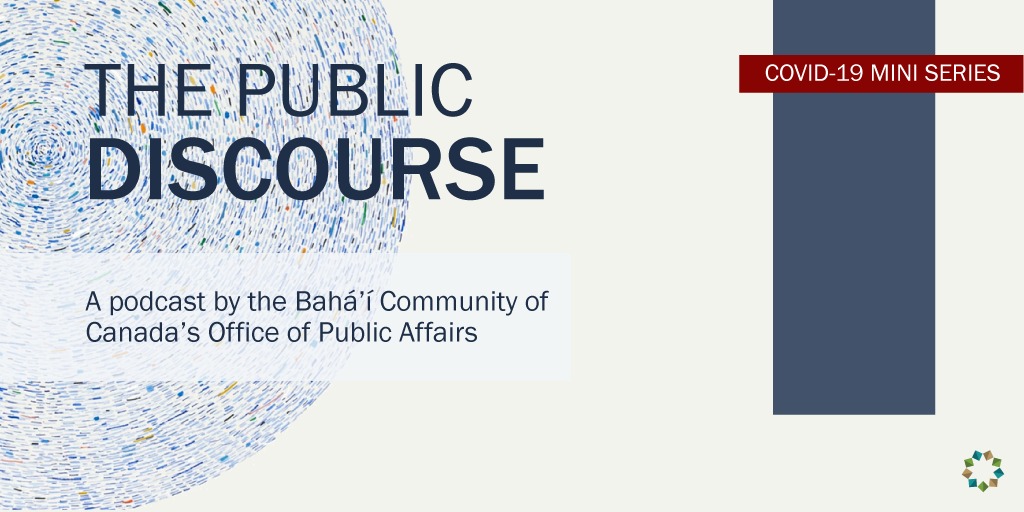“My hope for society is that this crisis allows us to see ourselves more accurately as one. That it brings home to us the oneness of humanity… that our fates are bound up together, our lives are bound up together.”

Those were the reflections of Eric Farr, a PhD student and a guest on The Public Discourse, a new podcast hosted by the Baha’i Community of Canada’s Office of Public Affairs. He was a guest on the second episode of a podcast mini-series, “Resilience in the face of adversity,” focused on the values that are guiding our society in response to the coronavirus pandemic.
That episode was on The Power of Religion, and he was joined by Hannah Marazzi, a stakeholder officer with the think tank Cardus, and Esther Maloney, Executive Director of the Illumine Media Project. Delaram Erfanian, Communications Manager with the Office of Public Affairs, facilitated the discussion.
“I think we can also see how worldwide, resilience is contagious and communities themselves can catch this sense that not everything is shut down and there are many ways that we can care for one another,” reflected Maloney. Their discussion focused on how religion and spirituality help to inform the ways we are thinking and acting in the face of the pandemic, and they explored how this is giving rise to a new consciousness that can help society to rebuild in its aftermath.
The third episode of The Public Discourse focused on the Role of the Community. Laura Friedmann, a Media Officer with the Office of Public Affairs, discussed this theme with Ana Serrano and Shabnam Tashakour. Serrano holds leadership positions with the Canadian Film Centre and Open Democracy Project, and Tashakour is a member of the Bahá'í Continental Board of Counsellors for the Americas.
Reflecting on how Baha’i communities across the country have been adapting to the pandemic, Tashakour commented: “We see all as protagonists in a community building process. So, there are efforts to raise consciousness, and awareness of knowledge, that could protect everyone in this pandemic. These efforts have been drawing on the talents of the community, in their own voices, in their own languages. Young people are at the forefront of that, using creative means.”
Serrano added that people are becoming more conscious of the values they want to see reflected in society: “I think if we figure out a way to pay attention, then I think we can see how – in the next iteration of our society – there may be a lot of things that we thought were valuable… are actually not as important anymore. A new set of values are emerging that we are realizing have much more material importance to us.”
The most recent episode explored Leadership and Public Policy, with Karim Bardeesy and Akaash Maharaj. Bardeesy is the Executive Director of the Ryerson Leadership Lab and Maharaj is the CEO of the Mosaic Institute. They talked with Geoff Cameron, Director of Public Affairs, about the qualities of leadership during a time of crisis, and how to build a unifying vision around public policy that serves the common good.
The conversation focused on the ways in which both political leaders, as well as community leaders, can promote a sense of empathy and shared purpose at this time.
“The key to democracy isn't strong leaders, it is strong societies that give rise to effective leaders,” said Maharaj. “The agency of individual citizens, of civil society organizations, of community groups, that is real democracy.”
“What I'm hopeful for,” added Bardeesy, “is that there will be some form of big debate in Canada around the desire to return to what was, versus the building anew, and that all those “build anew” factions can come together.”

